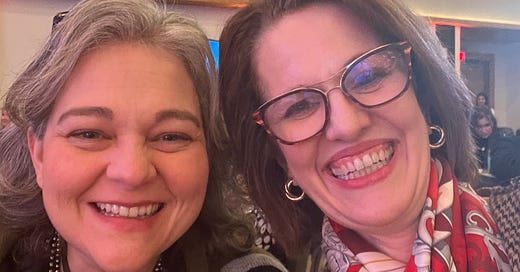When you hear the word "Ambassador," what comes to mind? Most of us picture grand embassies in distant capitals, formal receptions, and high-level negotiations. But diplomacy isn’t just for government officials—it happens in our own backyards, too.
"If anybody thinks, 'I can't be an ambassador,' you absolutely can," says Felecia Maxfield-Barrett. "You just have to figure out where the global is happening in your community."
Meet Felecia Maxfield-Barrett, CEO of Utah Global Diplomacy. Based in Salt Lake City, her organization connects everyday Utahns with visitors from around the world, with support from the U.S. Department of State.
Utah might not be the first place that comes to mind when you think about global affairs, but Felecia has worked with people from over 174 different countries—without ever needing a passport. I caught up with her at the annual meeting of Global Ties.
Finding a Global Calling Close to Home
Felecia was born and raised in a small Utah town called American Fork. "I lived there my entire life. I was a first-generation college student. My parents, God bless them, had high hopes for me—to do better than they did, which for them just meant graduating high school and not getting pregnant."
So, she went to college, packing up her tiny Ford Festiva—“it looked like a roller skate,” she jokes—and driving three hours to Southern Utah University. She chose anthropology as her major, initially because it was the fastest path to a degree. But soon, she was hooked.
"What I noticed was that these really interesting themes would emerge in people’s stories—this thread of shared humanity when people just started talking to each other." Anthropology was no longer just a subject; it became part of her identity.
Becoming an Anthropologist Without Leaving Home
Traditionally, anthropologists travel to far-flung places to study unfamiliar cultures. But Felecia realized she could do that work right in Utah. The state has a large refugee community—people from Somalia, Iraq, Burma, and Venezuela—and they needed support adjusting to life in the U.S.
Felecia got to work:
Teaching English
Helping foreign-trained doctors and nurses get certified in the U.S.
Explaining practical cultural differences—simple things like how to use a bank card or take a break at work
It was hands-on, meaningful, and fun.
How Do Utahns Respond?
Felecia has seen firsthand how global connections change lives—not just for foreign visitors, but for the local community. One in three Utahns who meet foreign visitors through her program go on to build lasting connections. Some start business partnerships. Others are inspired to visit their new friends abroad.
One moment stands out. While speaking in a rural community far from Salt Lake City, she noticed a stern-looking man sitting in the back of the room—arms folded, wearing a big cowboy hat, watching her intently. When he finally raised his hand, she braced for confrontation.
Instead, he surprised her.
"International relations is the cornerstone of us being a better community," he said.
He was a dairy rancher. That very morning, he had already been on the phone with ranchers in Japan, New Zealand, and Australia, swapping ideas about cattle feed. This guy was globally engaged and wanted more. "I would love to sit down with other ranchers from around the world and talk about our shared challenges," he told her.
His only request? "Those visitors have to be part of our community. We want to share meals with them, invite them to our festivals, and show them what makes our home special." Spoken like an anthropologist!
That moment shifted Felecia’s perspective. Diplomacy wasn’t just about welcoming international visitors—it was about connecting with fellow Americans, too, and appreciating how their lives already are global.
Bicycle Diplomacy and the Power of Shared Experiences
One way Felecia fosters those connections is through what she calls "bicycle diplomacy." Every year, she joins people from all walks of life on a bike ride across Iowa. Pedaling through the heat, sharing stories, and celebrating small victories along the way, they build bonds that transcend political or cultural differences.
"You may not agree on everything," she says, "but when you're riding for miles and then sharing a well-earned rest, you realize just how much you have in common."
For Felecia, this work isn’t just fulfilling—it’s patriotic. Visitors leave Utah with a more positive view of America, and Utahns gain a deeper understanding of the world. "It brings the global down to a personal level," she says.
Takeaways from Felicia’s Experience as an Everyday Ambassador
You don’t have to travel far to be a diplomat. There’s important global work to be done right where we are.
People in every corner of society have valuable global expertise. Felecia begins by asking, how she can support the success of a dairy rancher in rural Utah who depends on global networks? What can I learn from him?
Look for the "thread of shared humanity." Seek creative ways to connect, like bicycle diplomacy.
The best diplomacy happens through partnerships between governments and ordinary citizens. Programs like Felecia’s thrive through collaboration with the State Department.
I’ll be featuring Felecia on an upcoming episode of the *Everyday Ambassador* podcast. Stay tuned to hear more about her journey!





